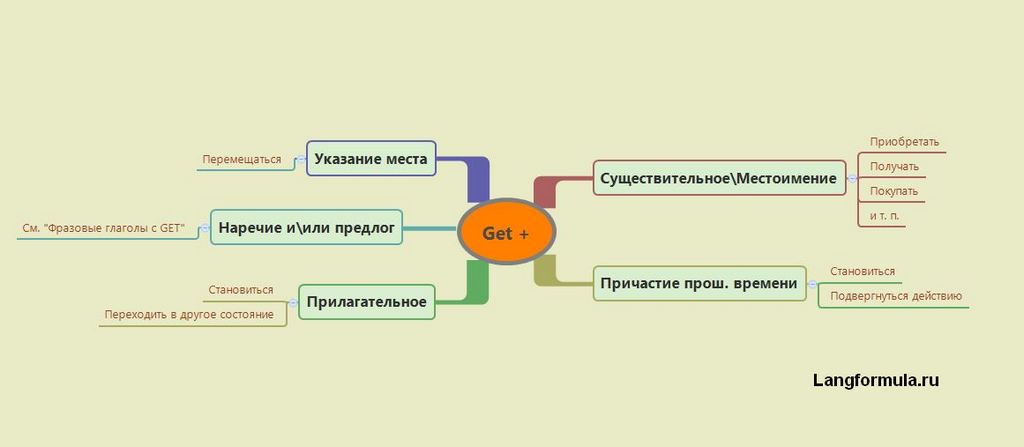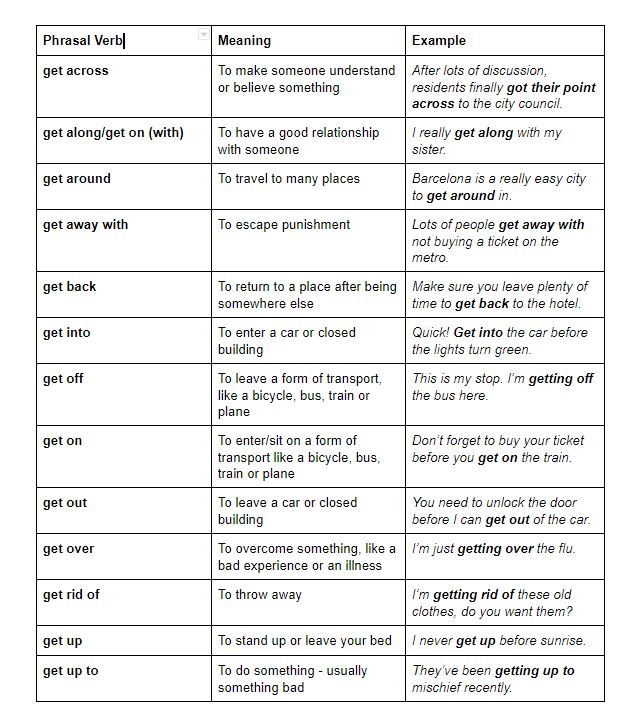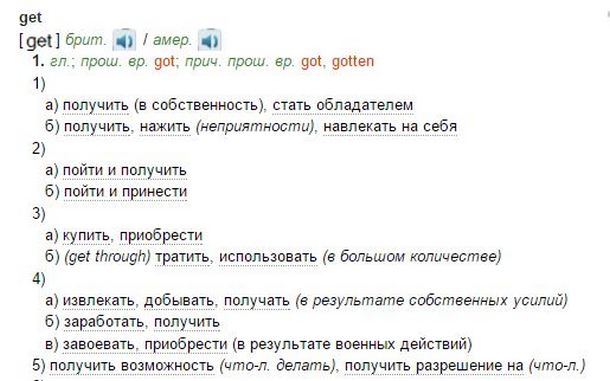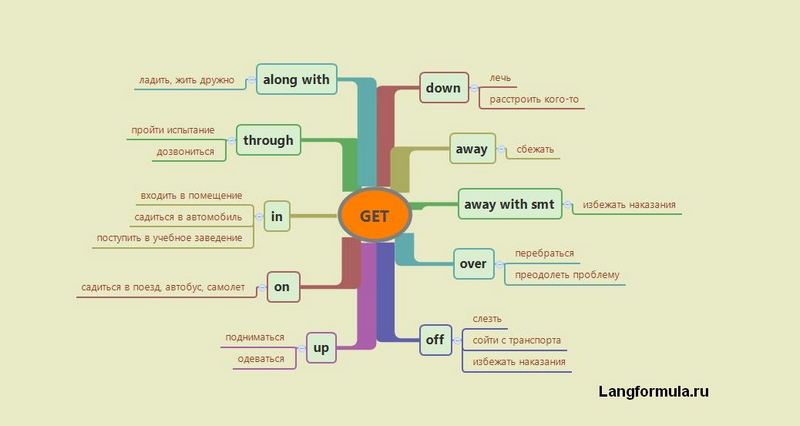Download the worksheet!
Hello students, and welcome to day 2 of our mini-course on words with multiple meanings!
Yesterday’s word was RUN, and today we’ll focus on GET. Again – a very common word, but one that is extremely versatile – this means it can be used in lots of different ways.
You already know the basic meaning of GET, but today you’re going to learn 20+ more ways to use it. Let’s get started:
get = receive
“Get” means receive. You can:
- get a gift
- get an email
- get a chance (meaning to receive an opportunity)
- get a grade on a test
- get an award
- get a scholarship
There are lots of collocations with GET meaning “receive.”
get = obtain
A second meaning of get is to obtain. This is a little different from receive – when you receive something, you made no effort – someone else gave it to you. If you get a gift for your birthday, you didn’t do anything to receive it.
But when you obtain something, you put in some effort. So you can get a job (you applied for the job, maybe you did an interview, and then they offered you the job).
You can get information, meaning you go and search for the information so that you have it. You can get some sleep, meaning you take the action of going to bed. You can get results at work, so you’re probably doing tasks in order to obtain results, get results.
get = buy
Get can also mean to buy. You can get tickets to a concert. If you see someone wearing a shirt you like, you can say “Where did you get that shirt?” meaning where did you buy it.
You can get something for a good price or get a bargain on something, both of which mean to pay a fair or small amount of money compared to the high value you receive.
For example, you can get a bargain on the Complete Program at Espresso English, because it’s available at a 50% discount – so you can buy it at a good price.
Another place we use “get” to mean “buy” is when we’re ordering at a restaurant or coffee shop – it’s very common to say “Can I get a large coffee?” or “Can I get some french fries?” – meaning you want to order, you want to buy that food/drink item.
Get tickets for a concert (buy them)
get = bring
We also use get in the sense of bring. If I’m already in bed and I feel cold, I might ask my husband, “Can you get me an extra blanket?” meaning can you bring it to me.
We often say “go get” when someone needs to go somewhere in order to bring back an item. Let’s say there’s a meeting at work, and there aren’t enough chairs in the meeting room – then, my assistant could go get more chairs, meaning she will go and then bring the chairs.
Or if someone’s injured, you might say “I’ll go get the first aid kit!” meaning you’ll bring it.
get = arrive
Informally, we use “get” to mean arrive. For example: I usually get home from work around 6:00 – meaning arrive at home.
You can use “get” when talking about arriving from travel – If we take the next available flight, we’ll get to New York on Monday morning.
When asking for directions, you could say “How can I get to the train station?” – how can I go there, how can I arrive there.
We’ll get to New York by noon.
get = become
Get also means become. You can get angry, get excited, get tired, get sick, get older, and get lost.
Something can get better or get worse, meaning it is becoming better or worse.
We also use it for changes in marital status: two people can get engaged (meaning they plan to marry each other), get married, and get divorced.
You can also get dressed, meaning to put on your clothes, and get ready, meaning to prepare yourself. When you get drunk it means you become intoxicated with too much alcohol, and when you get used to something it means you become accustomed to it.
All these expressions use “get” in the sense of becoming, changing status.
They got engaged last weekend.
get = understand (informal)
Another informal use of “get” is to understand. If you say “I don’t get it,” it means “I don’t understand.”
You can also say “I don’t get…” followed by a question word and the topic you don’t understand, for example:
- I don’t get why they broke up; they seemed to have a perfect relationship.
- I don’t get how to use this computer program.
- Or if someone tells a joke, and you didn’t understand what’s funny about it, you could say you didn’t get the joke.
get to do something = have a special opportunity
If you get to do something, it means you have a good/special opportunity, for example:
- If my kids finish all their homework, they get to watch a movie before bed.
- He’s upset because he didn’t get to take a vacation last year.
have got to do something = have an obligation; should do it
On the other hand, if you have got to do something, it means you need to do it, you have an obligation to do it, or you should do it. This typically sounds like “gotta” in informal spoken English. Here are some examples of “gotta” referring to obligations:
- I’ve gotta pick up my kids from school.
- If you borrow books from the library, you’ve gotta return them.
- That movie is awesome – you’ve gotta see it! (you should, a strong recommendation)
If you borrow books from the library, you’ve gotta return them.
get someone to do something = persuade/convince the person to do it
When you get someone to do something, it means you persuade/convince the person to do it.
- After a lot of discussion, I finally got him to agree with me.
- It’s hard to get my kids to help with housework.
get something done = cause it to happen
Finally, when you get something done, it means you make or cause it to happen. Sometimes this means doing it yourself, and other times it means you cause someone else to do it for you. For example:
- I like to get all my housework done by noon. (This means I finished it myself)
- My car has broken down – I need to get it fixed. (This means I will probably take it to a mechanic and they will fix it)
My car has broken down – I need to get it fixed.
Phrasal verbs with GET
GET is also used in a ton of phrasal verbs… and even many of these phrasal verbs ALSO have multiple meanings! Here’s just a sample of a few common phrasal verbs with get.
To get along with someone means to have a good relationship with them, without conflict. Or we could say the opposite, not get along with someone, meaning two people don’t like each other or have conflict/tension in their relationship.
- I’m glad I get along with all my coworkers.
- I don’t get along with one of my cousins; I find her so annoying.
The phrasal verb get around is used for managing to go places, physically. If you have a broken leg, you would find it difficult to get around on crutches. Some cities, like London, have an extensive public transportation system, so it’s easy to get around, to manage to go from place to place.
It’s hard to get around on crutches.
Next, we have get back. This can mean to return to a place – for example, I’m going shopping at a bunch of stores, and I’m not sure what time I’ll get back.
There’s another meaning for this phrasal verb, and that is when we say get back at someone, it means to take revenge; to do something to hurt a person who hurt us in the past.
The expression get over means to recover emotionally from a difficult experience. If someone you love dies, it would take you a long time to get over it.
Another way to use this expression is as a command, telling someone “Get over it!” – we do this when the person is continuing to be sad/upset over something minor or silly, and we want them to stop obsessing about a minor problem.
When it comes to transportation, we get into / get out of cars, and get on / get onto / get off trains, buses, planes, bicycles, and motorcycles.
We get into a car, but get onto a bicycle
Idioms with GET
To finish up this lesson, let’s look at a couple idioms with get. The word get is used in hundreds of idioms… so this is just a small taste. If you’d like to focus more on idioms, you can join my 300+ Idioms Course for a lot more expressions.
Our first idiom is to get wind of something, which means to learn about or hear about some secret, usually indirectly. Let’s say a teenager is planning to have a party while his parents are out of the house – but then his parents get wind of it, they learn about this secret, when they see a comment he made on social media. They discovered the secret in an indirect way.
When a celebrity or famous person is involved in a divorce, they often try to keep the details private because when the media gets wind of it, then they will publish all the information about it.
Get wind of something = hear about / learn about it indirectly
Another idiom is to get your act together. This means to take action to become well-organized and better-prepared. For example, let’s say your friend Maria has started and stopped studying English many times in the past, never really taking it seriously. She could decide to get her act together by committing to an English course and establishing a regular schedule for studying. She has taken action to be better organized.
One very informal expression you might hear in TV shows or casual conversations is “Get a load of this!” – we say that when we want to call someone’s attention to something that seems especially notable or interesting. If you see a luxury car you know is worth $100,000, you could say to your friend, “Get a load of that car!” because you want your friend to notice it.
Sometimes people also say “Get a load of this” when they are about to share some scandalous information; for example – “Get a load of this – our college professor was fired because he was flirting with one of his students.”
Sometimes when you’re doing a task, you enter a state where you really have all your energy focused on it, you’re totally concentrating on it, and as a result you are working or learning very smoothly and efficiently. Entering this state of concentration is called getting in the groove.
Sometimes when I’m writing English lessons, I get in the groove and the ideas come very easily to my mind because I’m so focused and fully immersed in the task. Or maybe you like to do a big cleaning of your house once a month, you take the whole day to get in the groove and fully clean your house from top to bottom.
get in the groove = enter a state of focused concentration, so that you make progress easily
I hope my lessons can help you get in the groove when it comes to studying English – my goal with Espresso English is to help you learn in a way that’s easy, efficient, and fun. That’s all for today – make sure to tune in for tomorrow’s video on words with multiple meanings.
Download the worksheet!
The word ‘get’ is one of the most common and versatile verbs in English. It can be used in lots of different ways, and is usually seen in informal writing or speaking. You can use the word ‘get’ on its own, with a preposition to make a phrasal verb, or with a participle in the passive voice.
Now we’re going to look at some of these uses in more detail. So, let’s get started!
1. Get = to obtain, to receive, to buy
The word ‘get’ can be used as a verb to express the actions of obtaining, receiving or buying. To form a sentence, we use get + direct object or get + indirect object + object.
Let’s take a look at some examples. Don’t forget ‘get’ is an irregular verb, so when we use the past simple we change (or conjugate) to ‘got’
To obtain
- She got the telephone number from her boss.
- I got the grade to pass the course.
- Unfortunately, Henry didn’t get the job.
To receive
- Did you get my letter?
- He got a fine for driving too quickly.
- I got a delivery this morning.
To buy
- Can you get some milk from the shop?
- I didn’t get you a newspaper. I’m sorry.
- He’s just been shopping and got a new face cream.
2. Get = to reach, to arrive
We can use ‘get’ when talking about arriving or reaching a place, to express movement or travel. To form a sentence, we use get + place expression. After the word ‘get’, we also normally use the preposition ‘to’.
To reach
- How long did it take you to get to the top of the mountain?
- If you keep walking you’ll suddenly get to a bridge.
To arrive
- I usually get home at 7pm.
- What time do you get to school?
3. Get = to become
‘Get’ is also used to express a change of state or situation. To form a sentence, we use get + adjective.
To become
- Don’t get angry!
- Wear a jacket or you’ll get cold.
- The weather gets warmer starting in April.
- In the UK it gets dark at 5pm.
- After going for a run, I get really hungry.
4. Get as a phrasal verb
‘Get’ can be used in phrasal verbs, which have various meanings. To form a sentence, use get + preposition/adverb. Here are a handful of common examples:
5. Get in the passive
We can also use the word ‘get’ in the passive form. Here it is used in place of the verb ‘to be’ to sound more informal. So, instead of using the standard passive be + participle, we can also use get + participle. For example:
- My bike was stolen (standard passive)
- My bike got stolen (get passive)
We use the passive form when we want to emphasize the nature of the event, or the people involved instead of who does the action. For example:
- Mike just got promoted. (Emphasis on Mike rather than his boss)
- The burglar got arrested. (Emphasis on the burglar rather than the police)
‘Get’ is also very commonly used to describe negative events. For example:
- Our house got badly damaged in the storm.
- We got delayed coming back from London.
6. Get something done
Our final use of the word get is a more informal way of saying ‘to have something done’ for us or to us. This is normally when we pay for some kind of service – such as at the hairdresser, mechanic or dentist. To form a sentence, we use the structure get + object + past participle.
To get something done
- I’m getting my hair cut on Wednesday.
- I got my teeth checked at the dentist this morning.
- I need to get my laptop repaired.
- I’ll get your coat cleaned if you like.
- He gets his car washed every Saturday.
Enjoy this post? Check out our blog post: 10 phrasal verbs to help you become an English expert.
Glossary for Language Learners
Find the following words in the article and then write down any new ones you didn’t know.
Versatile (adj): able to be used for lots of different purposes.
Get started (exp): to begin.
Hairdresser (n): the place where you go for a haircut.
Key
adj = adjective
exp = adverb
n = noun
Study English at Oxford House Barcelona
Interested in taking an English course at Oxford House Barcelona? Check all the different English classes we can offer you now or in the summer, or contact us for more information.
Study English at Oxford House Barcelona
Interested in taking an English course at Oxford House Barcelona? Check all the different English classes we can offer you now or in the summer, or contact us for more information.
Every language has one of those words that you hear all the time, but it’s used in so many different ways that it can be really confusing. In most cases, the translation of this word doesn’t make any sense, or you wouldn’t use this word the same way in your native tongue. In this video article we’re going to learn about one of the English language’s most commonly misused and often misunderstood words, GET.
GETTING TO KNOW GET
The word “get” always leaves people in doubt, and it can be very frustrating for the average English learner. The problem is that their are so many expressions and phrasal verbs that use the word “get” that it can be very confusing. Let’s take a look at some literal meanings.
Join the RealLife English community and GET connected with English learners from all around the world
6 Uses of the Word ‘Get’
The word “get” is so commonly used as a substitute for many words. A lot of the time when we use “get” it makes it less formal and it’s a lot more common in spoken English. Here are some examples of the 5 most common substitutions.
GET = BECOME (before adjectives)
When used before an adjective, the word get is a common substitution for the word become. This means that you are starting to become that adjective.
- If you don’t eat now you will get hungry later
- He got really angry when I told him I was leaving
- she is getting really skinny
GET = ARRIVE
The word arrive sounds formal when used in conversation. Arrive would be commonly used at airports/ travel arrangements or in a serious business setting. In normal situations we tend to use “get”.
- What time did you get there?
- I’ll ring him when we get to the park
GET=RECEIVE
This is a common mistake amongst Brazilians. Usually a Brazilian would use the word, “win” (Ganhar) in this case. In English “win” would only be used in regards to a prize or a competition/game.
- I got some cool presents for my birthday
- I got an email from my friend in Australia
- She always gets paid on Thursday
GET = OBTAIN/BUY
The word “buy” is used when you’re specifying the fact that you purchased something. If that’s not so important we substitute it for our good friend “get.”
- I got a new suit to wear to the conference.
- They got their instruments from the U.S.A.
GET = UNDERSTAND
This is simply an alternative way to say understand. You will here this more so in informal conversation but it doesn’t sound rude or inappropriate if it is used in a formal setting.
- Do you get what I’m saying?
- I don’t get it/ Got it!
GET = FETCH
In other words this meaning of “get” is when you leave where you are to collect (fetch) something and come back. A lot of people use the word take in this case which would be incorrect.
- Can you get me a glass of water?
- I’m going to get her from work.
- I’m going out to get some milk.
Expressions with GET
These are some of the most common, out of many. For more a more extensive list of expressions with “get”, check out this link http://www.wordreference.com/enpt/get To get along with- to have a good relationship with someone or a group of people.
- I get along really well with my co-workers
- He doesn’t get along with his in-laws
To get over something- to no longer feel bad, frustrated, or sad about something.
- I’m getting over the chicken pox
- He’s still getting over his bad break up with his girlfriend
To get rid of- to be relieved of something in you life by giving it to someone or throwing it away
- I’m trying to get rid of my old car but no one wants to buy it
- The boss got rid of all the unnecessary office equipment
To get to know someone- to be in the phase of learning about a person and becoming friends with them; to be starting to know all about a person, city, or even a product or service.
- I would really like to get to know your sister
- I’m getting to know the city really well
- I should start getting to know how to use this program
To get by- to be able to survive with the limited supply or knowledge of something that you have.
- I make just enough money to get by
- My Spanish isn’t so good but I can get by
So now that you know the uses of the word get, go out and put it to test. Try identifying the different uses of get while watching a movie, T.V. show or listening to some music or podcasts. Hopefully you will start to get how we use get little better, take advantage of all the online English resources and get excited about learning. That’s enough “gets” for one day, If you have any questions or feedback feel free to comment. Until we meet again Real Life English readers.
Like what you read?
For more articles that will revolutionize your English and to stay current with everything happening in RealLife English (community, events, resources) remember to sign up for our mailing list!
Get is a power word in the English language.
There are so many different meanings. This might be confusing for you as an English learner. But it’s important to learn how to use this word.
In this lesson, you’re going to learn 10 of the most common ways this word is used. And then, I’m also going to share some idioms with you.
The key to all of this is to learn the sentences. That way, you will internalize this word and how to use it. Learn more about to do that at the bottom of the post.
For now, watch the video and then take the lesson below.
10 Ways to Use the Word GET in English
Here are the ways in which we use get in English. Read the definitions and the examples. And then, see the collocations and idioms too.
Gain possession of / buy
Look behind me. Recently, I got some new things for my office. I got these *cough* fake plants, neon light, wall decorations… this means that I bought these things. Here are more examples:
- What did you get for your birthday?
- I’m thinking about getting a new car soon.
- I haven’t got my wife anything for Christmas yet – I’m starting to panic!
To become ill or have an illness
Yes, you can say catch a cold but it’s more common to say get a cold. Here are more examples:
- I’ve got a cold
- She keeps getting sick
- I’ve got a bit of a headache today.
Click here to learn more about sickness vocabulary. Or watch below:
To obtain and/or bring something to someone
This is something that is used a lot at home. For example:
- Could you get me a tea?
- Could you get me the remote?
- If you have time, get me some bananas on your way home (first conditional)
- Get some breakfast and then we’ll go
An alternative here is to bring up or down. For example, could you bring me up a cup of tea?
To hear or to understand
Listen to this: Time flies like an arrow, but fruit flies like a banana. You can respond to that by saying, “I’m sorry. I didn’t quite get that.”
- I don’t get what you mean. Could you explain that again?
- I didn’t quite get that – could you speak up?
To become (change)
This is really useful. Look at this example:
- It’s getting dark
It’s not dark now but it’s changing from light to dark. We use get to talk about a change.
- Your tea’s going getting cold. I’d drink it now*
- It’s getting hot out there
- Yawn. I’m getting tired.
*My wife and I talk about PDT: perfect drinking temperature. This is when the tea isn’t too hot and it’s too cold. It’s just right.
To learn more about how to talk about the weather, click here.
Movement
A good example of this is this one:
- What’s wrong with you? Why are you hobbling?
- I stubbed my toe getting into bed.
Here are more examples:
- Get down!
- Get your hands out of your pockets.
- I stubbed my toe getting into bed
- Let’s get outside – it’s beautiful out there
To leave public transport
After you get on a train you… get off it.
- Let’s get off here
- Where do we get off if we’re going to Big Ben?
- Get off at the next stop
This can be a little confusing. Because you get out of a car but get off a train. You get in the car but on a train.
This is why it’s important to learn English through sentences. And if you want to get audio sentences from this lesson – along with flashcards and many other resources – join TFP.
Arrive
Now speaking of traveling, when you arrive at your destination, you can use get here too.
- When is David going to get here?
- When mum gets here, turn off the TV, okay?
- Come on, let’s get going, we’ll get there really late otherwise.
- I hope my package gets here today.
To Receive or Be Given Something
- Let me know what you get in that quiz
- I got my hair cut yesterday – what do you think?
- I got my acceptance letter yesterday!
Collocations with Get
Collocations are simply two or more words that go together naturally. For example, you take a quick shower not a fast shower.
Now, some of the following can be explained through rules, but it’s important to learn them more naturally. To internalize them and to be able to use them instantly during natural conversation.
With that in mind, here are some of the more common collocations with get:
Get Married
This means to be joined in marriage. Notice the difference between to be married and to get married from the following examples:
- They got married last year
- They’re married
The first one talks about the act of getting married. The second focuses on the situation. Here are more examples:
- When are you going to get married?
- We’re getting married next year
That last example is in the present continuous. We use the present continuous to talk about future events.
Get Ready
There are two definitions here. Firstly, it can mean to put on clothes. For example, come on, get ready. We have to leave soon. Here are more examples:
- It takes her forever to get ready
- How long does it take you to get ready?
- I’m getting ready – almost done!
It can also mean prepare. Imagine that you’re throwing a party for the World Cup Final. You might say, we need to get the house ready for our party. Here are more examples:
- Can you get the presentation ready for tomorrow?
- Get ready… this is going to be a tough exam.
Get home/in
Before, you learned that we use get when we arrive somewhere. To get home is a good example of this:
- Come on, let’s get home
- What time did you get in last night?
- Is he getting home tonight?
Get some/any sleep/rest
Let’s get home and get some rest. This just means to sleep or to rest. We often use some/any in between get and sleep/rest. Here are more examples:
- I just need to get some sleep
- Do you think we’ll get any rest next week?
- I didn’t get any sleep last night
Get into trouble
Look at this example: He’s always getting into trouble! This means that he’s always misbehaving and either their parents, the police, or their teachers are punishing them.
Here are more examples:
- He got into a lot of trouble as a kid but he’s good now
- Try not to get into trouble tomorrow!
- What can we do to stop you from getting into trouble?
This can also mean to fall into difficulty.
- If you get into any trouble when traveling, call me straight away!
- We got into some financial trouble last year but we managed to get out of it.
Idioms with the Word Get
There are many idioms that include get. Let’s have a look at some of these now.
Get to the bottom of something
This means to discover the truth about something – often when the truth is hidden or hard to find.
It’s used in formal situations, mainly. For example, if things have gone missing at a school but no one knows why, the principal might say: we need to get to the bottom of this.
More examples are:
- The police are trying to get to the bottom of who committed that crime
- Let’s get to the bottom of this, ASAP
Get the hang of
This means to learn how to do something. For example, it didn’t take me long to get the hang of driving on the right side of the road. Or the wrong side…
- It might take you a little time to get the hang of how to use get but if you follow my methods you’ll definitely get there
- I just can’t get the hang of it
Get a kick out of something
To enjoy something – to find something amusing.
- Are you getting a kick out of me falling over?
- I still get a kick out of Blackpool losing
Over to You
There’s a lot to learn in this lesson. Knowing how to use GET can help. But the key to being able to use these sentences naturally, flexibly and fluently when speaking is to repeat the phrases until you memorize them.
That is where my program can help. You can get premium resources based on this lesson here. We’d love to have you!
Thank you for reading. Please share this lesson below!

Глагол get очень часто используется в английском языке, особенно в разговорной речи. Нередко говорят, что это один из самых многозначных глаголов в английском: он может использоваться в разных значениях, а также входит в состав фразовых глаголов и устойчивых выражений. Благодаря такой многофункциональности, глагол get очень помогает в разговоре, упрощая построение фраз.
Содержание:
- Сколько значений у глагола get?
- Формы глагола get.
- Get + существительное или местоимение.
- Get + прилагательное или причастие.
- Get + указание места, направления.
- Фразовые глаголы с get.
- Устойчивые выражения, словосочетания, идиомы с глаголом get.
- Глагол have got has got.
Англо-русский словарь Lingvo приводит 37 значений глагола get, 10 000 примеров из текстов и 1437 словосочетаний с этим словом. Вот некоторые из них:
Словарь Oxford Dictionaries дает тоже около 30 значений глагола, а также список фразовых глаголов, в состав которых входит get. Как все это запомнить? Задача становится проще, если выражения с get сгруппировать по строению и смыслу. Окажется, что основных значений всего четыре:
- Приобретать, получать (get + существительное или местоимение).
- Становиться, переходить из состояния А в состояние Б (get + прилагательное).
- Подвергаться действию, становиться (get + причастие прошедшего времени).
- Перемещаться из одного места в другое (get + указание места).
Отдельно нужно рассматривать устойчивые выражения и фразовые глаголы с get (get + наречие иили предлог).
Формы глагола get
Глагол get — неправильный, он образует формы Past Simple и Past Participle особым образом: get — got — got. Также он часто используется в длительных формах Present Continuous, Past Continuous и Future Continuous.
Get + существительное или местоимение
Если глагол get используется с прямым дополнением, выраженным существительным или местоимением, его значение – «приобретать», «получать», «покупать» и тому подобные.
Он может быть заменен такими словами, как obtain (получать), receive (получать), buy (покупать), purchase (покупать, приобретать), но в разговорной речи все чаще сводится к простенькому get. Это очень удобно!
| Get = получать, приобретать, покупать (obtain, buy, purchase) | |
|---|---|
| I got (obtained) my visa last month. | Я получил визу в прошлом месяце. |
| She got (obtained) her driving license in 2011. | Она получила водительские права в 2011 году. |
| They got (obtained) permission to live in France. | Они получили разрешение на проживание во Франции. |
| I got (received) a letter from my friend. | Я получил письмо от своего друга. |
| She got (bought, purchased) a new car. | Она купила новую машину. |
| We got (bought, purchased) a new fridge. | Мы купили новый холодильник. |
Get + прилагательное или причастие прошедшего времени
Если get используется с прилагательным или причастием прошедшего времени (третья форма глагола, Past Participle), он значит «становиться», «превращаться», «переходить в состояние», иногда его можно заменить глаголом become (становиться).
В случае с причастием прошедшего времени значение может быть «подвергаться действию», так как действие направлено на лицо или предмет, о котором идет речь.
В обоих случаях глагол get часто используется во временах Continuous (be getting), если нужно подчеркнуть длительность действия.
| Get + прилагательное = становиться, переходить в другое состояние | |
|---|---|
| I am getting (growing, becoming) old. | Я старею (становлюсь старым). |
| It’s getting (becoming) hotter. | Теплеет (становится теплее). |
| I’m getting (becoming) tired of all this nonsense. | Я устаю (становлюсь уставшим) от этой чепухи. |
| It gets (becomes) dark very early in the winter. | Зимой темнеет (становится темно) очень рано. |
| Don’t touch the stove until it gets (becomes) cool. | Не трогай плиту пока она не остынет (станет остывшей). |
| Get + причастие прошедшего времени = подвергаться действию | |
| They are getting married in August | Они поженятся в августе |
| How did you get hired? | Как тебя приняли на работу? |
| Get dressed. | Одевайся. |
Примечание: конструкция get + прямое дополнение + Past Participle означает выполнение действие одним лицом для другого. Вместо get может использоваться have (чаще он и используется).
| I need to get/have my shoes repaired. | Мне нужно починить туфли (чтобы кто-то другой их починил для меня, отдать на ремонт). |
| We should get/have the roof painted. | Нам следует покрасить крышу (напр., нанять кого-то, кто ее покрасит). |
Get + указание места = прибыть
Когда get используется с указанием места, обычно глагол принимает значение «прибыть», «переместиться», «попасть».
| Get + указание места = прибыть, переместиться | |
|---|---|
| How are we getting home tonight? | Как мы попадем ночью домой? |
| We got (arrived) to New York around midnight | Мы прибыли в Нью-Йорк около полуночи. |
| What time will we get (arrive) there? | Во сколько мы туда попадем? |
| Get (go) over here! | Иди сюда! |
Фразовые глаголы с get
Напомню, фразовыми глаголами называют сочетания глагол + предлогнаречие, которые воспринимаются и используются не как сочетание слов, а как цельная речевая единица.
Особенность фразовых глаголов в том, что их значение не всегда можно угадать. Например, легко догадаться, что get up — это «вставать», но значение «одеваться, нарядиться» совсем не очевидно. Фразовые глаголы нужно воспринимать и учить не как наборы из двух-трех слов, а как цельные смысловые единицы.
Вот некоторые употребительные фразовые глаголы с get.
- Get up -1) подниматься, вставать, 2) одеваться, нарядиться.
Get up or give up. — Вставай или сдавайся.
I want to get up in a nice dress before we go to the party. — Я хочу нарядиться в красивое платье перед тем, как мы пойдем на вечеринку.
- Get down — 1) лечь, пригнуться, 2) расстраивать кого-то.
It’s gonna blow! Get down! — Сейчас взорвется! Ложись!
This weather is getting me down. — Эта погода меня расстраивает.
- Get away — сбегать, избегать, улизнуть.
We got away from the cops. — Мы сбежали от копов.
- Get away with something — избежать наказания.
Hey, stop! You can’t get away with that! — Эй, стой! Тебе это с рук не сойдет!
He stole my money and thought he could get away with it. — Он украл мои деньги и думал, что избежит наказания.
Don’t kill me! You can’t get away with murder! — Не убивай меня! Убийство не сойдет тебе с рук!
Примечание: выражение «get away with murder» иногда используется в переносном смысле в значении «сделать что-то плохое безнаказанно».
She’s our teacher’s daughter, so she always gets away with murder. — Она дочь нашего учителя, так что ей всегда все сходит с рук.
- Get over — 1) перебраться через что-то, перелезть, 2) преодолеть проблему, справиться (в т. ч. с болезнью).
Get over the wall and come here. — Перелезь через стену и иди сюда.
She can’t get over her shyness. — Она не может справиться со своей застенчивостью.
The problem can be got over. — Проблема может быть решена.
I thought she would never get over her illness. — Я думал, она никогда не справится с болезнью.
- Get off — 1) слезать с чего-то, 2) сходить с транспорта, 3) избегать наказания или отделаться легким наказанием.
Please, get off the table. — Пожалуйста, слезьте со столика.
I’m getting off. — Я схожу (выхожу из автобуса, машины, поезда).
You got fined for a robbery? You got off very lightly. — Тебя оштрафовали за ограбление? Да ты отделался очень легко.
- Get on — садиться в транспорт: поезд, автобус, самолет (НЕ в машину).
She got on the bus at 10 a.m. sharp. — Она села в автобус ровно в десять утра.
- Get in — 1) входить в помещение или садиться в автомобиль, 2) поступать в учебное заведение.
Get in and fasten the belt. — Садись и пристегни ремень.
Did your daughter get in? Mine did. — Твоя дочь поступила? Моя поступила.
- Get through — 1) пройти испытание, сдать экзамен, 2) дозвониться по телефону.
I didn’t get through the exam, it was too difficult. — Я не справился с экзаменом, он был слишком трудным.
Did your get through? — Вы дозвонились?
- Get along with — ладить с кем-то, быть в хороших отношениях.
I can’t get along with my colleagues. — У меня не получается ладить с коллегами.
Are you getting along with your classmates? — У тебя все нормально (ты ладишь) с одноклассниками?
- Get across — 1) пересечь, перейди на другую сторону, 2) добиться понимания, донести мысль.
It’s impossible to get across the road with all this traffic. — Невозможно перейти дорогу с таким движением.
He’s not very good at getting his ideas across. — У него не очень хорошо получается доносить свои мысли.
- Get by — выживать, справляться с трудными условиями, «протягивать».
How does she get by on such a small salary? — Как она живет на такую маленькую зарплату?
It’s hard to pay the bills now but we will get by. — Трудно сейчас платить по счетам, но мы справимся.
Устойчивые выражения, словосочетания, идиомы с глаголом Get
Приведу также некоторые устойчивые сочетания и наиболее употребительные выражения с глаголом get.
- I got I gotta — у меня есть (сокр. от I have got, см. ниже).
I got a few question. — У меня есть несколько вопросов.
- Get down to the business — перейтиприступить к делу.
Let’s get down to the business. — Давайте перейдем к делу.
- Get real! — Взгляни правде в глаза!
You are not going to be together. Get real. — Вы не будете вместе. Взгляни правде в глаза.
- Get your hands off! — Убери свои руки!
Get your hand off her! — Убери от нее свои руки!
- Get it — понимать.
Did you get what the teacher was explaining in class? — Ты понял, что учитель объяснял в классе?
Yes, I got it. — Да, я понял.
- Get dinner (lunch, supper etc) — Приготовить еду.
It’s my turn to get breakfast this morning. — Сегодня моя очередь готовить завтрак.
- Get the bill — оплачивать счет (напр. в ресторане).
Put your wallet away! I’ll get the bill. — Убери свой бумажник, я заплачу.
- Get rid of something — избавиться от чего-то.
I’m going to get rid of all these old papers. — Я собираюсь избавиться от всех этих старых газет.
- Get married divorced — жениться, выйти замуж развестись.
When are you getting married? — Когда вы женитесь?
- Get drunk — напиться.
Did you get drunk again? — Опять напился?
- Get home — прийти домой.
I got a whole lot of things to tell her, when I get home. — Мне нужно будет много есть сказать, когда я приду домой.
- Get a job — найти работу.
Why did not you get a job? — Почему ты не нашел работу?
- Get hired — устроиться на работу (т.е. приняли, взяли на работу).
How did you get hired if you had no experience? — Как ты попал на работу без опыта?
- Get ready — приготовиться.
Get ready, player one. — Первому игроку приготовиться.
- Get started — начать, приступить.
Well, let’s get started! — Ну, давайте начнем!
- Get lost — 1) потеряться, заблудиться, 2) в повелит. наклонении «Проваливай!»
Help! I got lost! — Помогите, я заблудился!
Get lost! — Проваливай!
- Get used to — привыкнуть (cм. подробнее: «Глагол used to»).
I got used to speaking in public. — Я привык выступать перед людьми.
Глагол have got has got
Стоить отметить, что часто глагол get входит в состав конструкции have got has got (иметь). Эта конструкция имеет тот же смысл, что и have has в значении «иметь что-то, обладать чем-то».
- I have got a dog = I have a dog (у меня есть собака).
- She hasn’t got any questions = She doesn’t have any questions (у нее нет вопросов).
- We’ve got some money = We have some money (у нас есть деньги).
- Have you got any idea? = Do you have any idea? (у вас есть соображения?)
Собственно, тут слово get не добавляет никакого значения. Главные отличия have got от have следующие:
- Have got используется в утвердительных, отрицательных и вопросительных предложениях, но только в настоящем времени.
- Have got используется в значении «иметь, обладать» и не заменяет have в устойчивых выражениях типа have breakfast, have fun и т. д.
- Сокращения ‘v или ‘s возможны только с have got has got:
- He’s a new car — неправильно (можно: He has a new car).
- He’s got a new car — правильно.
- I’ve many friends — неправильно (можно: I have many friends).
- I’ve got many friends — правильно.
Здравствуйте! Меня зовут Сергей Ним, я автор этого сайта, а также книг, курсов, видеоуроков по английскому языку.
Подпишитесь на мой Телеграм-канал, чтобы узнавать о новых видео, материалах по английскому языку.
У меня также есть канал на YouTube, где я регулярно публикую свои видео.



















